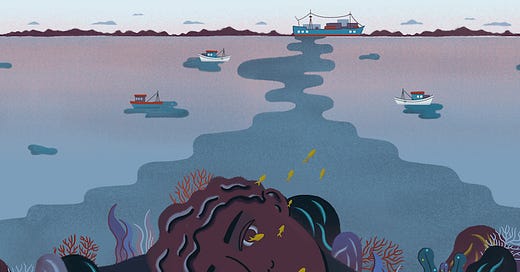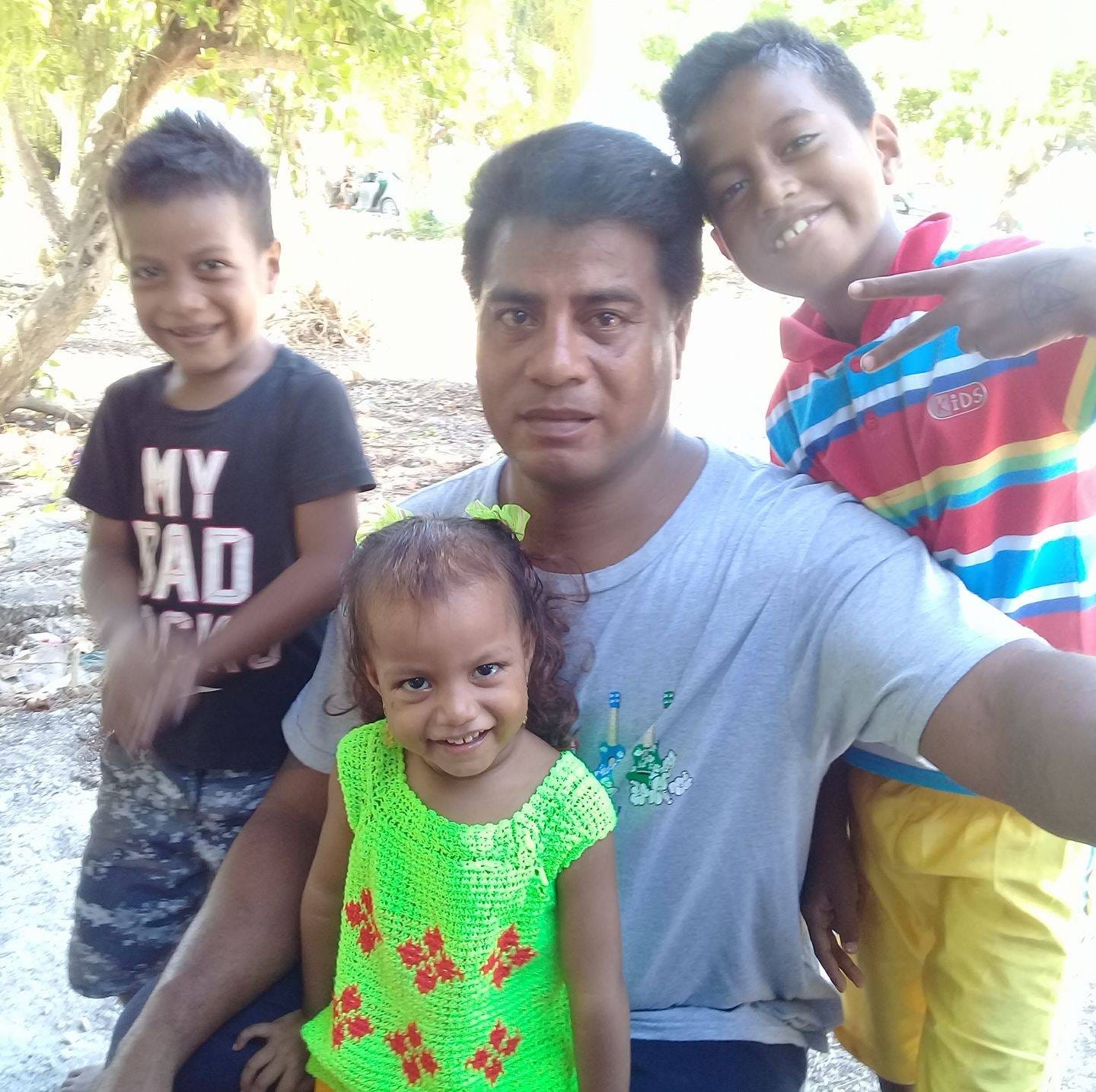Oceans Inc #4: Observational Hazards
A fishery observer's job sounds simple — to monitor fishing activity. So why do they keep disappearing at sea?
Welcome to Green Echoes, a newsletter from the Environmental Reporting Collective that highlights key investigative stories, data sources, funding, reporting and training opportunities and our projects from across Asia.
Oceans Inc
We’re a collective, with member newsrooms and journalists from atound the world, and several participated in the year-long Oceans Inc collaboration. Each week, they are also publishing parts of our the investigation with their audiences.
Worked to Death, released last week, was jointly-published by partner newsroom Mongabay.


And partner newsroom Initium Media published the investigation in Chinese.

You can also republish any of our articles. All Oceans Inc content is available to be translated, adapted, and republished for free under a Creative Commons license (CC-BY-NC 4.0). If you’re interested, respond to this email.
This week we are proud to announce the release of the fourth investigation, Observational Hazards, led by partner newsroom The Reporter, based in Taiwan, and investigates the far-too-frequent deaths of observers on fishing vessels in the Indo-Pacific.
Here’s an exert from this article.
Looking for resources and opportunities? Scroll down – they’re at the bottom.
Observational Hazards
Tekarara Kabangaki and her four young children, who live in the Pacific Island nation of Kiribati, are quite used to their father being away. As a fishery observer, he often spent months aboard fishing vessels, monitoring their practices and making sure they followed rules and regulations.
Whenever he had to fly out for a deployment, the family would wait outside the wire fence at the airport to wave goodbye as he boarded the plane. His youngest child, Bebe, has been eagerly awaiting his return since their last farewell.
Sadly, it is a reunion that will never happen. The father, Eritara Aati Kaierua, died in March 2020 while performing his duty aboard a Taiwanese tuna-fishing vessel, Win Far 636. He was 40 years old.
Protecting observers
The United States-based Association for Professional Observers (APO), was founded in 1995, and currently has around 1,600 members from all over the world.
Liz Mitchell, the current president of the APO, has been an observer for 25 years. As one of the few women in this male-dominated industry, she not only has to cope with the hardships of the job, but with harassment as well. She has been advocating for the rights of observers since becoming APO president in 2000.
Mitchell told The Reporter that investigating deaths and disappearances of observers is particularly frustrating because the people who report such cases are usually not governments or shipping companies, but mostly NGOs or other observers.
“We don’t know how many observers have actually died or went missing while working. For example, we only learned of three other Kiribati observers’ deaths after I started investigating Eritara’s death,” she said.
Neglected islands
Even after observers’ safety standards were reformed, conditions can still be perilous, especially for observers from Pacific Island nations.
The Reporter spent several months interviewing observers from Kiribati, the Solomon Islands, Vanuatu, and other Pacific island countries and found that even though RFMOs have safety standards on paper, most of them are poorly enforced in the region.
Pacific Island observers monitor fishing vessels from many countries. The region supplies 60% of the world's tuna. When they report violations by fishing vessels, the ship owners can be immediately required to stop operations or possibly be fined millions of dollars. But despite these high stakes, Pacific Island observers do not have the support system from the shore like observers in the U.S. or under the IATTC.
The Pacific Island observers we reached out to were keen to talk to us, though they all requested to remain anonymous to avoid getting in trouble.
Abel (not his real name) has worked as an observer for 10 years, spending most of it on Taiwanese longliners.
“The death of any observer would significantly affect us," he said. He emphasized that the frequency of threats and harassment against observers in recent years has returned to the early days when the regional observer programme just started. “Our rights have long been ignored, and the investigations into the deaths of observers have been disregarded.”
Reported cases of harassment of observers at work increased from 35 cases in 2013 to 84 in 2015, with observers saying the real numbers are likely much higher due to underreporting.
With tuna populations decreasing, shipowners are also taking more risks to ensure they make a profit, often at the expense of the observers’ safety, according to Abel.
Given all these risks, why does Abel continue to work as an observer? “I want my kids to have fish to eat,” he said.
"When I'm on a Taiwanese ship, I just try to be as nice as possible to the captain and crew,” he added.
To date, 11 of the 14 observer deaths have not been properly investigated — or investigated at all.
Read the entire investigation, which includes details of all the 14 deaths at sea and why they’re not being investigated properly.
Resources and Training
The National Press Foundation is looking for journalists from Asia, but especially South Korea and Japan, to participate in this workshop exploring Biomass and Climate Change, which will be held both virtually and in-person (apply ASAP).
The Global Initiative Against Transnational Organized Crime has released a new analysis on taking the fight against green crime, including wildlife trafficking, online. It includes ideas and resources for conducting your own investigations.
From Open Notebook, a new guide on how to cover environmental health issues with the science is lacking – something that far too common in Asia, but also when it comes to issues like zoonosis.
Northwestern University is offering its Fundamentals of Digital Image and Video Processing course for free online. Sign up here, as it start this month.
A request
The Pulitzer Center for Crisis Reporting is looking to start an initiative on climate change and the impact on labor rights, and are asking journalists for ideas, insights on where these connections are more evident or under-reported. Please fill out this short survey.
—
That’s all for this week – do let us know if we missed anything. We’re open to including other resources/trainings, if you have something you’d like us to share, let us know by responding to this email.
Stay safe and healthy,
Nithin Coca
The Environmental Reporting Collective is a growing network of journalists and newsrooms from over a dozen countries, all dedicated to investigating environmental crimes collaboratively.
To learn more about our work, check out our website, Investigative.Earth, and follow us on Twitter and Facebook.




